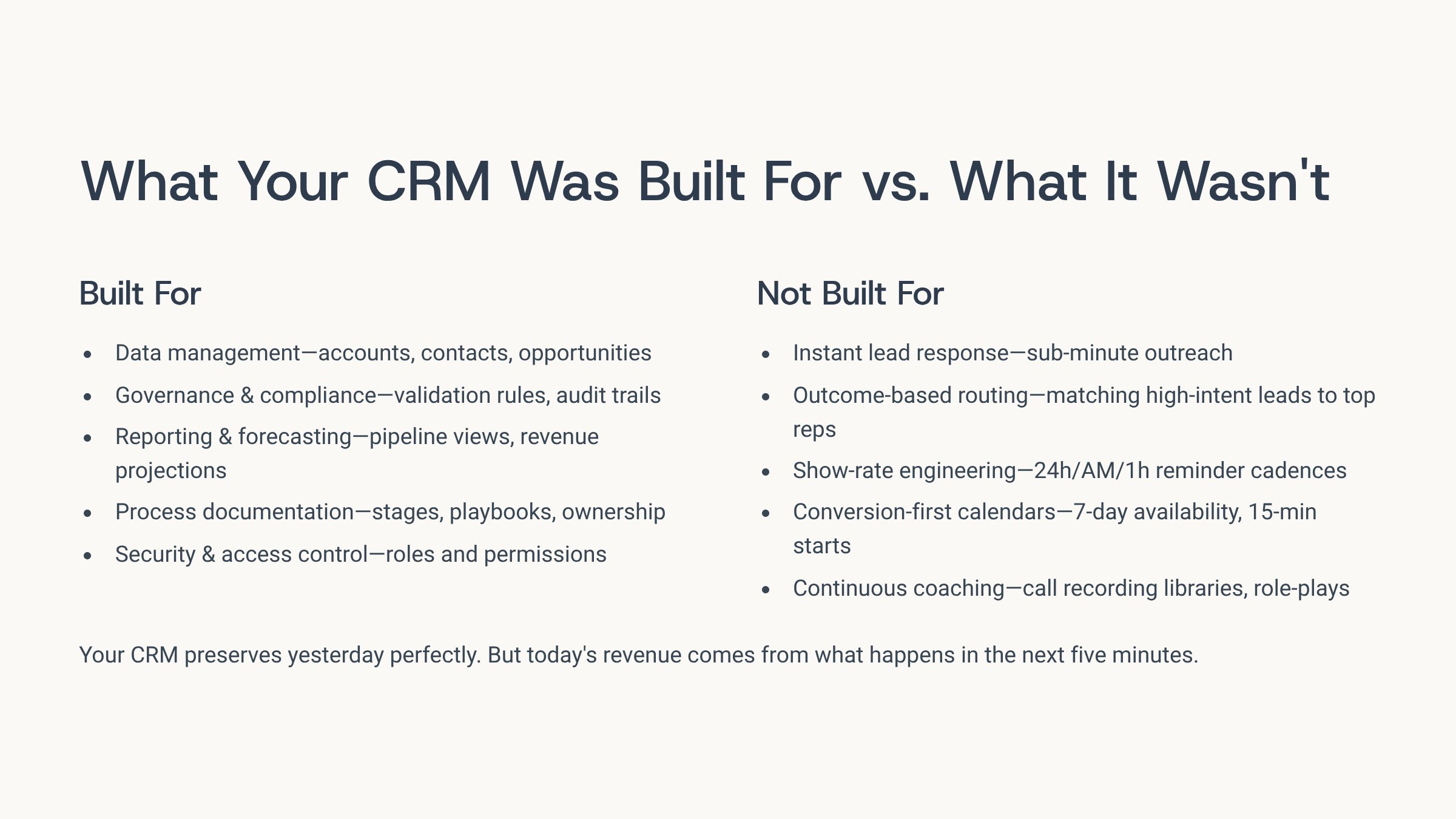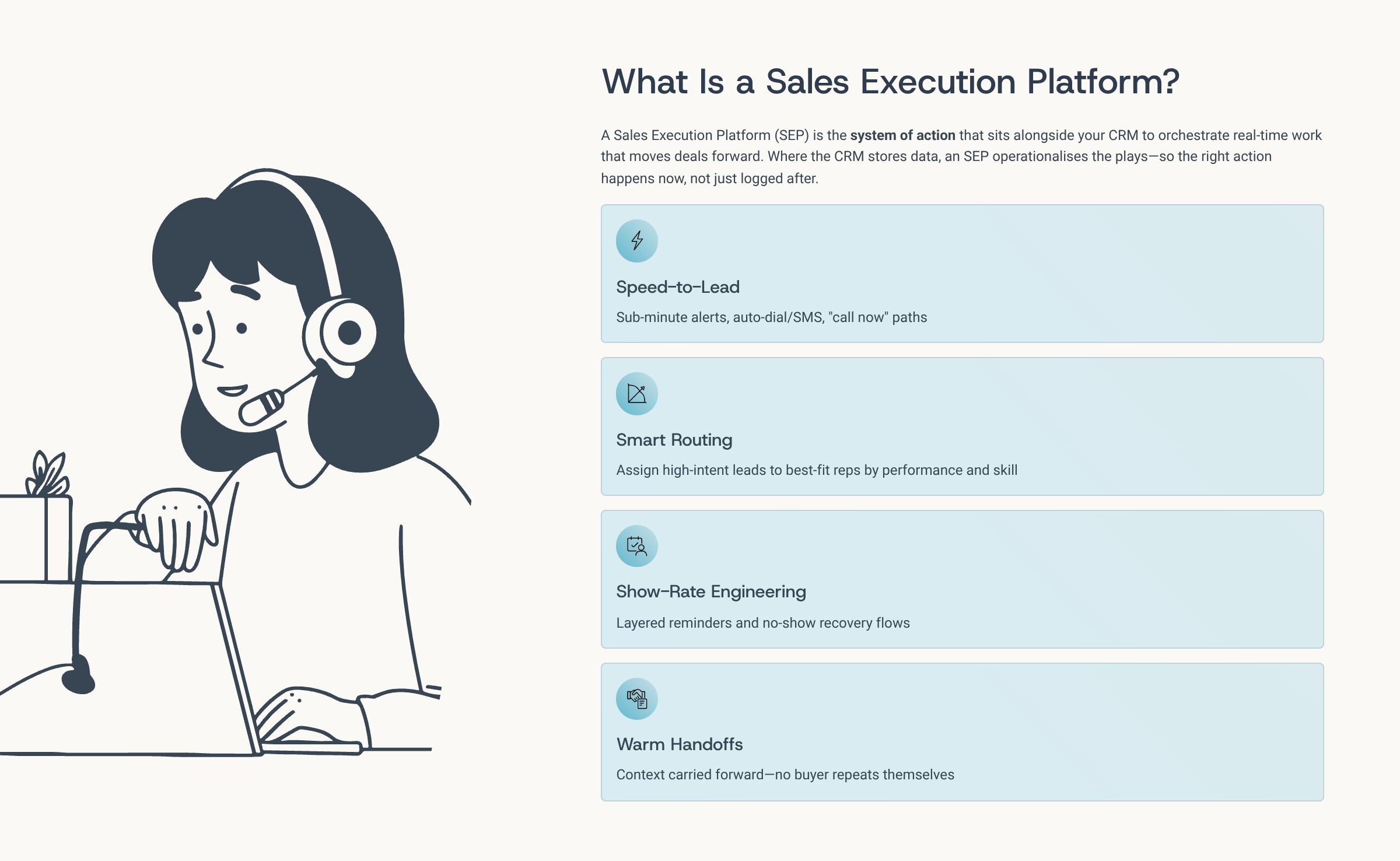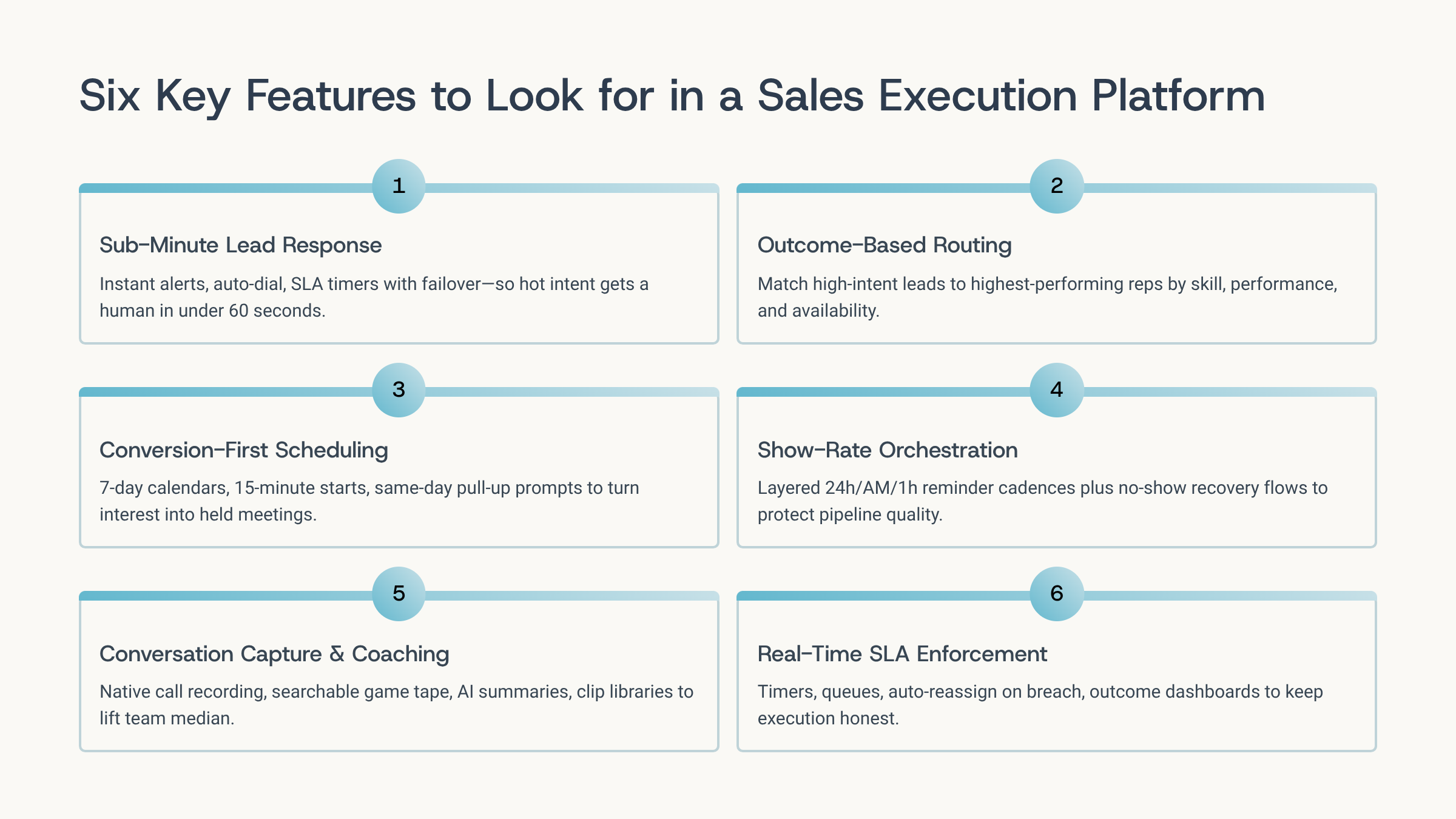Sales Execution Platform: Fix What Your CRM Was Never Built to Do
Article written by
Kate Williams

INSIDE THE ARTICLE
SHARE THIS ARTICLE
Summary
Your CRM isn’t built for execution—it’s built for record-keeping. That’s why reps still drown in admin, deals stall, and coaching falls flat. This blog breaks down what a sales execution platform actually does, how it transforms performance, what features matter, and why it’s the missing layer in your sales stack. The result? Less friction. More revenue.
If your CRM is the system of record, what’s your system of action? Pipeline fields won’t pick up the phone, and activity logs won’t engineer a show-up. A Sales Execution Platform (SEP) layers on top of your CRM to orchestrate the work—sub-minute speed-to-lead, smart routing, setter→closer handoffs, and live coaching from real call tape. Result? More connects, more shows, more wins. Keep the database. Add the do-base.
What Your CRM Was Built For vs. What It Wasn’t
It’s Monday, 9:00 am. Your pipeline review opens like a well-kept diary: every account neatly labeled, every contact attached, every stage color-coded. Someone added notes at 8:57—beautiful. Your CRM shines when the story is already written.
By 9:07 pm, a hot lead lands. Who calls first? Which rep should it go to? Is there a slot today, not next Thursday? Who’s nudging the prospect 24 hours before, the morning of, and one hour out so they actually show? Who’s listening to last week’s calls to coach today’s pitch? Suddenly, your diary can’t pick up the phone.
That's a simple scenario about what CRM could do and not do. Now, let's dive into a clearer picture.
What Your CRM Was Built For
Your CRM was built mainly for the following:
- Data management: Accounts, contacts, opportunities, activities, and tidy histories.
- Governance & compliance: Required fields, validation rules, approvals, and audit trails.
- Reporting & forecasting: Pipeline views, dashboards, and revenue projections.
- Process documentation: Stages, SLAs, playbooks, ownership, and handoffs.
- Security & access control: Roles, profiles, and field-level permissions.
- Basic tasking: Reminders and follow-ups—once the data exists.
What It Wasn’t
Your CRM is not meant to do everything; that includes:
- Instant lead response: Sub-minute outreach, “call now” escalation, and bursty inbound load.
- Outcome-based routing: Matching high-intent leads to top-performing reps.
- Show-rate engineering: Structured 24h / morning-of / 1h reminder cadences that lift attendance.
- Conversion-first calendars: 7-day availability, 15-minute starts, and “pull-up” same-day moves.
- Continuous coaching: Call recording libraries, clip reviews, and daily role-plays.
- Warm, context-rich handoffs: So buyers never repeat themselves across teams.
- Real-time enforcement: Triggering the right action now, not just logging it after.

Your CRM might preserve yesterday perfectly. But today’s revenue comes from what happens in the next five minutes.
What Is a Sales Execution Platform (SEP)?
A Sales Execution Platform (SEP) is the system of action that sits alongside your CRM to orchestrate the real-time work that moves deals forward. Where the CRM stores data, an SEP operationalizes the plays—so the right action happens now, not just gets logged after.
A sales execution platform coordinates who to contact, how fast, through which channel, with what message, and when to meet—then enforces those behaviors consistently across your team.
Core capabilities
Here is a glance into a few core capabilities that give the sales execution platforms the superpower:
- Speed-to-lead automation: sub-minute alerts, auto-dial/SMS, and “call now” paths.
- Smart routing: assign high-intent leads to the best-fit reps (performance-, skill-, or territory-based).
- Show-rate engineering: layered reminders (24h / morning-of / 1h), no-show recovery, and reschedule flows.
- Calendar intelligence: 7-day availability, 15-minute starts, “pull-up” same-day moves to fill gaps.
- Live coaching & call tape: record, analyze, and coach from real conversations.
- Warm handoffs: setter → closer → CS with context carried forward (no buyer repeats).
- Outcome analytics: track first-response time, show rate, pull-up rate, and conversion by rep/route.
How it fits with your CRM
In simple terms,
CRM = system of record (accounts, contacts, pipeline, reporting).
SEP = system of action (response, routing, reminders, coaching, handoffs).
They integrate bi-directionally—SEP triggers actions; CRM remains the source of truth.
Who benefits from SEP?
Though it benefits your entire organization's revenue generation, here are a few people who get's the most benefits out of SEP:
- SDRs/BDRs: Faster first touches, cleaner handoffs.
- AEs/Closers: Better-matched leads, fuller calendars, and higher show rates.
- RevOps: Enforceable playbooks, measurable SLAs, reliable pipeline inputs.
- CS/Onboarding: Fewer post-close drop-offs via warm handshakes.
Outcomes to expect (KPIs to watch)
Here are a few outcomes you could expect from SEPs:
- ↓ First-response time (target: <60s)
- ↑ Held-meeting rate / Show rate
- ↑ Conversion rate (lead→oppty, oppty→win)
- ↑ Rep utilization (same-day pull-ups, 7-day coverage)
- ↓ Post-close churn-backs (via aligned expectations)
SEP is a game-changer, isn't it?

How a Sales Execution Platform Takes Over Where Traditional CRM
CRM logs what happened. SEP makes the right thing happen—now.
Here is how it takes over the traditional CRM:
- Speed-to-lead: CRM creates a record; SEP auto-alerts, auto-dials, or triggers “Call Now” to hit sub-minute first contact.
- Outcome-based routing: CRM round-robins; SEP routes by skill/performance/intent so the best reps get the best leads.
- Calendar conversion: CRM shares links; SEP enforces 7-day availability, 15-minute starts, and same-day pull-ups to fill gaps and raise show rates.
- Show-rate ops: CRM sends generic reminders; SEP stacks 24h / morning-of / 1h manual + automated nudges and recovers no-shows.
- Live coaching: CRM stores notes; SEP records calls, scores them, surfaces clips, and powers daily huddles/role-plays.
- Handoffs with context: CRM passes fields; SEP drives setter → closer → CS warm handshakes so buyers never repeat themselves.
- Real-time enforcement: CRM tracks SLAs; SEP enforces them with timers, queues, and fail-safes (reassign, escalate, notify).
- Operational analytics: CRM reports activities; SEP measures first-response time, show rate, pull-up rate, and route→win impact—and tunes the playbook.
Quick comparison
Motion | Traditional CRM | With SEP on top |
|---|---|---|
New inbound lead | Record created | Instant outreach + <60s SLA enforced |
Lead assignment | Round-robin | Skill/intent-based routing |
Scheduling | Static link | 7-day, 15-min starts, same-day pull-ups |
Reminders | One-size automated | 24h/AM/1h manual + automation |
Coaching | Notes after calls | Recorded “game tape,” scoring, huddles |
Handoffs | Fields transferred | Warm handshake with next meeting booked |
SLA adherence | Reported later | Enforced in real time |
Insights | Activity counts | Outcome metrics that optimize execution |
Adding SEP turns your CRM from a memory of sales into a machine that creates sales.
How Can Sales Teams Benefit from Sales Execution Platform (SEP)
When revenue slips, it’s rarely because your CRM forgot a field—it’s because the right actions didn’t happen fast enough. A Sales Execution Platform (SEP) hardwires high-leverage behaviors—sub-minute response, outcome-based routing, show-rate mechanics, and coaching—so your team consistently turns interest into held meetings and wins. Here are the benefits of sales execution platforms in detail:
- Direct revenue uplift
Sub-minute lead response, outcome-based routing, and show-rate engineering translate into more meetings held and higher win rates. Watch: first-response time, show rate, lead→opportunity, and opportunity→win. - Cycle-time compression
Same-day/next-day bookings and “pull-ups” collapse the gap from interest to conversation to proposal. Watch: time-to-first-meeting, stage-to-stage days, and sales velocity. - Higher rep productivity
Smart queues, 7-day calendars, and enforced follow-ups keep reps focused on execution, not admin. Watch: talk time per day, meetings per rep, no-show recovery rate. - Better forecast quality
Calls recorded, touches verified, and BANT captured at the source reduce “hope deals.” Watch: stage integrity %, forecast accuracy, and slipped deals. - Consistent coaching & enablement
Game-tape libraries, huddles, and role-plays compound skills across the team. Watch: conversion by script/adherence, ramp time, and win rate by cohort. - Superior buyer experience
Faster replies, convenient slots (evenings/weekends), and warm handoffs mean buyers never repeat themselves. Watch: CSAT post-demo, no-show %, and time-to-value. - Cleaner data & governance
Real-time enforcement (SLAs, routing rules, handoff checklists) improves data completeness and auditability. Watch: required-field completion, SLA breach rate, and reassignments. - Cross-functional alignment
Sales ↔ CS tape reviews and BAMFAM handshakes align promises with delivery, reducing churn-backs. Watch: first 30-day churn, reopen/discount requests.
SEP turns the few behaviors that reliably drive revenue—fast response, smart routing, show-rate ops, and continuous coaching—into a repeatable system, lifting throughput without needing more leads.
Why sales teams can no more sustain without SEP
Modern buyers move in minutes, not weeks. Without a Sales Execution Platform (SEP) to enforce fast response, smart routing, show-rate mechanics, and continuous coaching, you leak revenue your CRM can’t plug.
The new realities (and why CRM alone isn’t enough)
Here are a few reasons why sales teams need sales execution platforms more than they think:
- Speed is the conversion moat. Inbound intent decays in minutes. Sub-minute response isn’t a nice-to-have; it’s the price of admission.
- Round-robin wastes yield. Outcomes hinge on fit (lead quality × rep skill). If your best leads don’t reach your best closers, win rates stall.
- Calendars are revenue engines. 7-day availability, 15-minute starts, and same-day pull-ups materially increase held meetings. Static links don’t.
- Show rate determines pipeline reality. Generic reminders ≠ attendance. Stacked manual and automated nudges (24h / morning-of / 1h) move the needle.
- Coaching must be continuous. Playbooks age fast. You need to call “game tape,” clip reviews, and daily role-plays to raise team median performance.
- Handoffs break deals. If setter → closer → CS isn’t a warm handshake with context carryover, buyers repeat themselves—and confidence drops.
- Real-time enforcement beats after-the-fact reporting. Logging misses after day-end doesn’t recover them. Timers, queues, and escalations do.
What’s at risk without SEP
Without SEPs:
- Lower conversion: First-response times drift to hours; connects and wins slide.
- Pipeline mirages: Meetings booked ≠ meetings held; forecasts skew optimistic.
- Longer cycles: No pull-ups or weekend coverage means a slower time-to-first-meeting.
- Rep inconsistency: Coaching becomes ad hoc; skill gaps persist.
- Buyer drop-offs: Cold handoffs and repeated discovery trigger no-shows and churn-backs.
The sustainment case
To survive (and grow) in a minutes-matter market, teams need a platform that turns high-leverage behaviors into defaults: respond faster, route smarter, schedule for shows, coach from tape, and handshake with context. That is how you protect pipeline quality, compress cycle time, and scale wins—without throwing more leads or headcount at the problem.
SEP Best Practices
If you can only operationalize five behaviors, make them these. They turn intent into held meetings and wins—fast.
- Enforce <60s speed-to-lead
Auto-alert → auto-dial/SMS; escalate or reassign at 60s. Watch: first-response time, connect rate. - Route for outcomes, not fairness
Skill/intent-based routing (“feed the killers”) beats round-robin. Watch: win rate by route, revenue/lead. - Design calendars for conversion
7-day availability, 15-minute starts, and same-day “pull-ups.” Watch: held-meeting rate, time-to-first-meeting. - Engineer show rates
Layer reminders: 24h → morning-of → 1h before (manual + automated). Watch: show rate, no-show recovery. - Record everything
Weekly clip reviews, daily role-plays, and scorecards tied to outcomes. Watch: conversion by script, ramp time.
Nail these five and you’ll see more connects, more shows, and more wins—without buying a single extra lead.
6 Key Features to Look Out For in a Sales Execution Platform
When you’re choosing a sales execution platform, ignore the shiny extras and zero in on the features that force revenue-moving behavior: faster first touches, fuller calendars, higher show rates, smarter routing, and better coaching. Here are the six that matter most.
- Sub-minute lead response
Instant alerts, auto-dial/SMS, “Call Now” rails, and SLA timers with failover—so hot intent gets a human in under 60 seconds. - Outcome-based routing
Rules that match high-intent leads to your highest-performing reps by skill, performance, territory, and availability (not just round-robin). - Conversion-first scheduling
7-day calendars, 15-minute starts, buffers, and same-day “pull-up” prompts to turn interest into held meetings. - Show-rate orchestration
Layered 24h / morning-of / 1h reminder cadences (manual + automated) plus no-show recovery flows to protect pipeline quality. - Conversation capture & coaching
Native call recording, searchable “game tape,” AI summaries, clip libraries, and scorecards to lift the team median every week. - Real-time SLA enforcement & analytics
Timers, queues, auto-reassign on breach, and outcome dashboards (first-response time, show rate, pull-up rate, and route→win) to keep execution honest.
If a platform nails these six, the rest is nice to have. Prioritize tools that enforce the right actions in real time—because that’s where compounding revenue lift comes from.

Top 5 SEP Picks
Here’s the 10-second tour of five credible sales execution options—what they’re best known for and when they shine.
SparrowGenie
AI-secured sales execution built around speed-to-lead, outcome-based routing, show-rate ops, and proposal/RFP automation; recent launch highlights include an AI RFP Generator that drafts purchase RFPs faster on the same platform engine.
Salesforce Revenue Cloud
Salesforce’s quote-to-cash suite unifies CPQ, billing, contracts, orders, and revenue recognition to streamline the end-to-end revenue lifecycle inside the CRM.
Gong Revenue Intelligence
Conversation intelligence and “Revenue AI” that records/transcribes calls and surfaces deal/coaching insights; newer “Gong Agents” automate follow-ups and forecast hygiene.
HubSpot Sales Hub
Integrated CRM and sales engagement with ready-to-use email templates, meetings, deals, and sequences for timed outreach and tasking—quick to deploy for growing teams.
Outreach
AI revenue workflow platform best known for sequences that orchestrate multi-touch engagement, plus forecasting and Kaia-powered coaching/meeting analytics.
Match the tool to your motion: prioritize sub-minute response, routing, show-rate ops, and coaching. Shortlist two, run a 30-day pilot, and keep the one that measurably lifts held meetings and win rate.
Conclusion
CRMs remember, but execution wins. If you want more pipeline that actually converts, hardwire the few behaviors that move revenue: respond in <60 seconds, route high-intent leads to your best reps, design calendars for same/next day with 15-minute starts, stack reminders (24h / AM / 1h), record calls and coach from real game tape, and pass context in warm handoffs so buyers never repeat themselves. A modern sales execution platform like SparrowGenie turns these into defaults—not hopes—so you get more connects, more shows, faster cycles, and higher win rates without buying more leads. Choose a platform that enforces these plays in real time, pilot it for 30 days, and keep the one that measurably lifts first-response time, held-meeting rate, and route→win.
Ready to see how AI can transform your RFP process?
Product Marketing Manager at SurveySparrow
A writer by heart, and a marketer by trade with a passion to excel! I strive by the motto "Something New, Everyday"
Frequently Asked Questions (FAQs)
Related Articles

The Essential Guide to RFP CRM Integration: What Actually Works in 2026

10 ChatGPT prompts for sales emails that actually work
